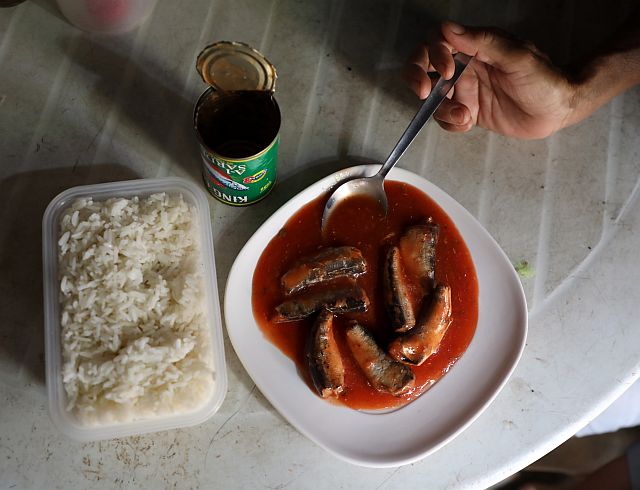
A can of sardines given in exchange for a bag of garbage collected make for a happy meal for residents of remote areas who barely have enough to make ends meet. (CDN PHOTO/TONEE DESPOJO)
PART 1
Eight-year-old John Paul Liray ignored the drizzle.
He was busy putting the trash he collected from a dirty creek into three sando bags.
Despite his frail frame, he carried the bags to a compactor truck parked at the interior sitio of Lower Laguerta in Barangay Lahug, Cebu City.
He was tired, dirty and wet from the sweat and rain. But the boy didn’t mind because he was able to get three cans of sardines from the personnel of Cebu City Hall’s Department of Public Services (DPS).
“These will be our dinner later,” said the boy in Cebuano.
The boy wanted to help his family since his mother’s income as a supermarket promodiser was barely enough for her four children.
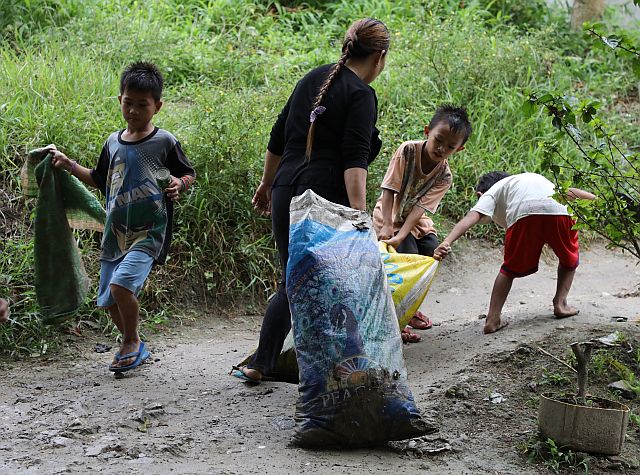
The children of Lower Laguerta help their parents pick up trash in line with the Cebu City government’s Basura mo, Sardinas Ko program. (CDN PHOTO/TONEE DESPOJO)
John Paul’s father had no job. Asked why, the boy just smiled shyly.
“Sige lang og inom ug lakaw (His father always drinks and goes out),” said James Sanico, 9, his classmate at the Lahug Elementary School where they just finished third grade.
The two hurriedly looked for bags and took out the trash from their homes after they heard from their neighbors that the DPS would be in their village for the “Basura Mo, Sardinas Ko” campaign of the city.
They even went to a nearby creek to get more garbage.
Under the program, a resident gets two cans of sardines for every sack of garbage and one can for a smaller sando bag, even if these are not segregated.
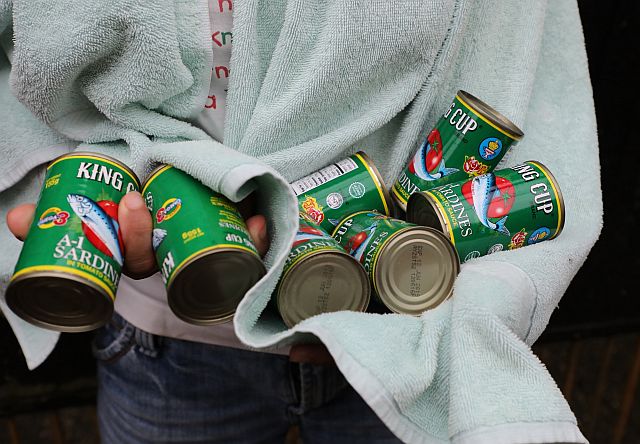
A resident of Lower Laguerta, Lahug, proudly shows off to CDN the several cans of sardines she has managed to get in exchange for several bags of garbage she collected in her neighborhood. (CDN PHOTO/TONEE DESPOJO)
According to Jerome Mañego, DPS staff in charge of the program, the city purchased 3,508 cartons of sardines using a budget of P4.4 million to implement the program starting in March.
Each carton contains 100 cans.
These would be enough to cover the one-year implementation of the program in the two pilot areas — Barangays Lahug and Cogon Pardo. Mañego said that in one day, they were able to distribute about 1,000 cans of sardines to residents of the selected sitios in the two barangays in exchange for four to five tons of trash.
Mañego said that in the morning, he would go to Barangay Cogon Pardo with one or two compactor garbage trucks, and Barangay Lahug in the afternoon.
“So far, the response has been good. People would tell me that the sitios have become cleaner ever since we started the program. Before, the residents would just throw their garbage anywhere. Now, residents are competing against each other to gather more garbage in exchange for more cans of sardines,” he said.
Luzminda Cansiran, 53, of Sitio Lower Laguerta in Barangay Lahug, agreed.
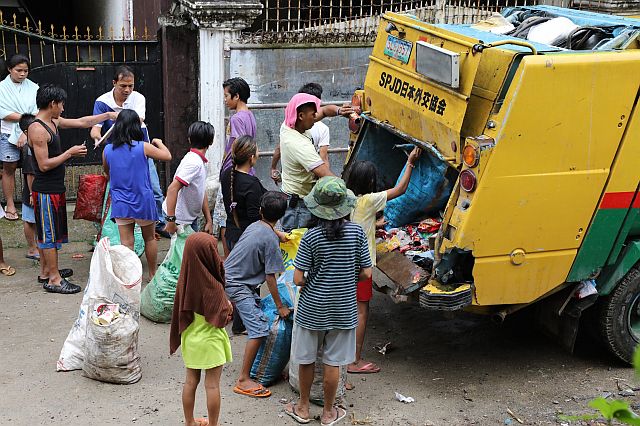
Residents from Cebu City’s interior sitios or zones rush to load the bags of trash they collected into a compactor truck to be able to claim the cans of sardines the city is giving away in exchange for their garbage. (CDN PHOTO/TONEE DESPOJO)
Garbage trucks had difficulty getting into the interior portion of the village.
To get rid of the garbage, the residents burn their trash or throw these into the river, which are prohibited under the Ecological Solid Waste Management Act of 2000 (Republic Act 9003) that penalizes violators with P300 to P1,000 fine or a jail term from one day to 15 days.
But the new program provides incentive to the residents to clean their surroundings, said Stella Marie Sotto, 38, who got 10 cans of sardines for her trash.
She said they had to compete with their neighbors since the village small truck could not accommodate all their trash.
The same competition was also observed in Barangay Cogon Pardo where some residents would even go to as far as the pond at the nearby South Road Properties (SRP).
They would then use a makeshift raft to carry their trash to the road where the DPS’ compactor trucks were waiting.
Assistant DPS head John Paul Gelasque said Cebu City Mayor Tomas Osmeña patterned the “Basura Mo, Sardinas Ko” from a similar program in the City of Curitiba in Brazil.
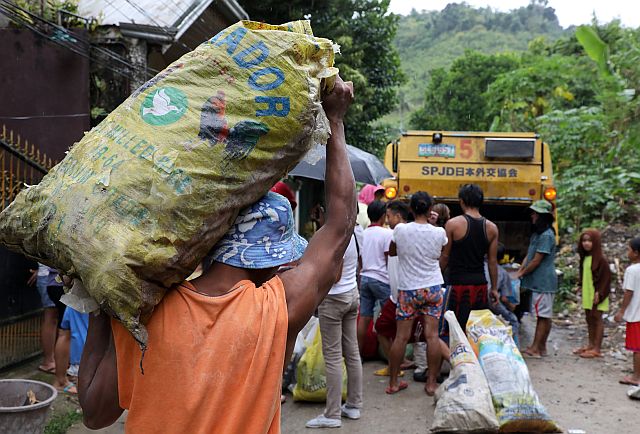
Residents from Cebu City’s interior sitios or zones rush to load the bags of trash they collected into a compactor truck to be able to claim the cans of sardines the city is giving away in exchange for their garbage. (CDN PHOTO/TONEE DESPOJO)
There, according to a 2013 article from the Huffington Post, former Curitiba City Mayor Jaime Lerner was quoted as saying that the garbage collection was a big problem in their city.
He said garbage trucks could not enter the narrow streets, steep hills and deep valleys, prompting residents to dump their trash in rivers and fields.
The situation is similar to Cebu City. Although it is a booming metropolis, only 20 percent of the city is in the urban area while the rest are in the mountainous areas and hinterlands.
In Curitiba, bus tokens are given to residents for every segregated garbage delivered to the truck.
“In three to four months, the neighborhoods were all clean. It was a win-win solution,” Lerner was quoted in the article.
Gelasque said Barangays Cogon Pardo and Lahug were selected as pilot areas because these villages are located near rivers and creeks.
These barangays also have interior areas that are not easily reached by garbage trucks.
With the program, the city hopes to lessen the volume of garbage which usually ends up in the rivers and creeks that eventually flow into the sea.
Unless the practice is stopped, the garbage will clog waterways that can lead to floods during heavy rains.
Disclaimer: The comments uploaded on this site do not necessarily represent or reflect the views of management and owner of Cebudailynews. We reserve the right to exclude comments that we deem to be inconsistent with our editorial standards.




